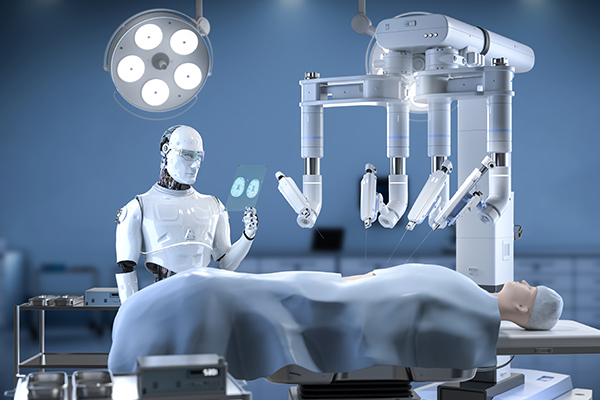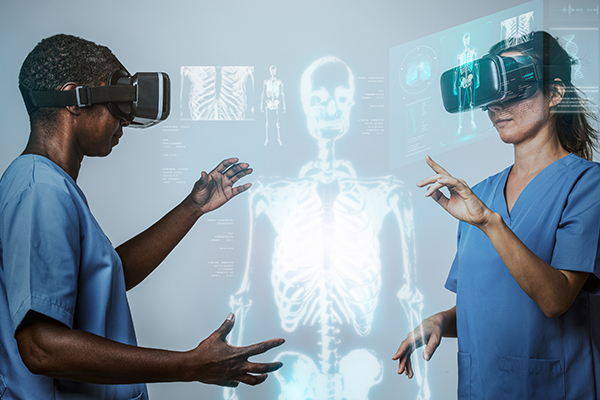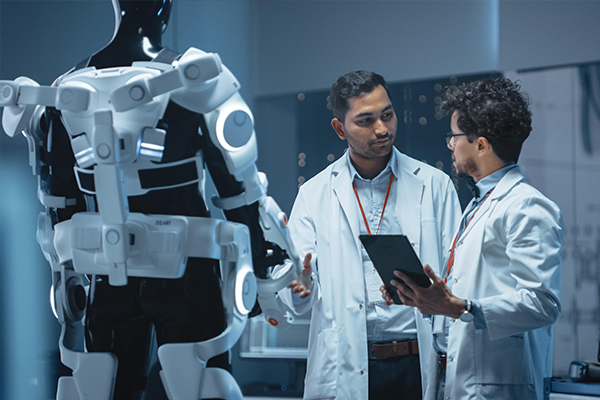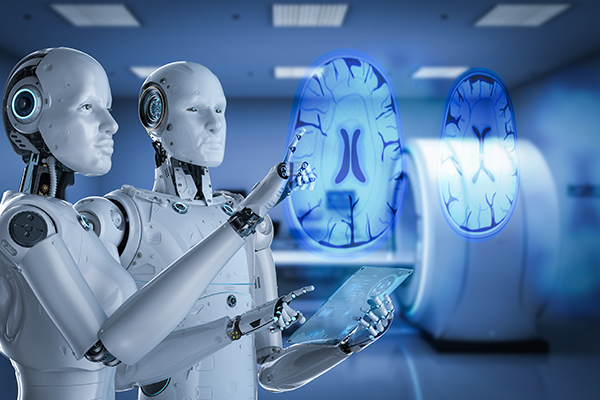Revolutionary progress in Healthcare is on the horizon and it’s primarily being driven by the rapid advancements in Artificial Intelligence (AI). The recent unveiling of the futuristic ‘Agent Hospital’, the world’s first AI hospital in China, is a beginning glimpse into what lies ahead in the medical field. With patient care at Agent Hospital handled by 14 AI doctors and 4 AI nurses, the program will initially be used to train real-life doctors in university settings, though it’s certainly anticipated that the virtual medicos will eventually be treating patients in hospitals across China with this potentially high-quality, affordable and accessible public healthcare .
AI technology is already transforming healthcare in ways we probably never thought possible – from robotic surgery to virtual nursing assistants, and now it seems there’s immense potential for AI-driven hospitals to improve patient outcomes and reduce medical costs.
If this has caught your interest, read on, because in this article, I’ll discuss the exciting, and somewhat mind-boggling, implications of AI-driven medical care and how this technology is being harnessed to improve the current healthcare system.
A Brave New Era in Medical Education
Medical education has always faced the challenge of preparing students for the rigours of real-world practice. Traditionally, this has involved student medicos observing live procedures, practising on simulators, and eventually treating patients under supervision. However, the establishment of AI hospitals is set to revolutionise this by creating a risk-free environment where medical students can interact with AI patients.
Facilities such as AI hospitals will allow students to practise their diagnostic and treatment skills without fearing harm to real patients. And with this practice undertaken in such a tightly controlled setting, it not only boosts confidence but also ensures newly trained doctors are well prepared for real-world medical challenges.
The Rise of Virtual Doctors
One of the most revolutionary aspects of AI in healthcare is the development of virtual doctors, who are driven by LLM-powered intelligent agents capable of autonomous interaction. With the capacity to analyse massive amounts of medical data, virtual doctors can diagnose and provide accurate and personalised care plans for patients, reducing the potential for human error.
This technology has already been implemented in various fields, such as radiology and cardiology, and as an example AI algorithms can analyse medical images to detect abnormalities that may be missed by human doctors, leading to earlier detection and treatment of diseases.
And importantly don’t forget, virtual doctors are available 24/7 and can handle multiple patients at the same time, potentially reducing wait times and improving overall efficiency in the system.

Robotic Surgery
AI-driven robots are also transforming surgery by supporting surgeons with more precise tools and the ability to perform complex procedures. With AI technology, robotic surgery can be done remotely from anywhere in the world, enabling expert surgeons to assist or even perform surgeries on patients in other countries.
And with AI technology continuously learning and evolving, there’s the very real potential to improve surgical precision even further, reducing complications and recovery time for patients.

Virtual Nursing Assistants
As well as virtual doctors, AI-driven hospitals can have virtual nursing assistants attending to patient care and performing tasks such as scheduling appointments and reminders for medication, freeing up human nurses to focus on more critical and complex care.
This technology can also support patients in their homes, providing remote monitoring and assistance for chronic conditions, potentially reducing hospital readmissions.
Implications and Future Prospects

Efficient and Accessible Healthcare
The integration of artificial intelligence (AI) in hospitals is poised to entirely reshape the healthcare system by enhancing both accessibility and efficiency. Being able to swiftly and accurately process a high volume of cases, AI-enabled hospitals will be able to significantly reduce the workload on human medical professionals.
In real and practical terms this means shorter waiting times for patients, accelerated diagnoses, and timely treatment, and collectively those factors combine to result in improved patient outcomes and overall satisfaction with the system. Quite possibly the most exciting aspect of these tech developments is the accessibility factor. AI technology can ensure even the most remote and under-serviced regions will have access to high-quality healthcare services. By bridging the gaps that currently exist in global healthcare accessibility, AI hospitals can deliver a more equitable healthcare system where everyone can receive the care they need, regardless of their geographical location.
Challenges and Considerations
Despite the immense potential and promise that AI brings to healthcare, its integration is fraught with several challenges that need to be acknowledged and addressed.
First and very importantly is the need to ensure that AI technologies comply with national and international medical regulations. Regulatory bodies will need to establish watertight frameworks to safeguard public health and ensure that any application of AI in healthcare is both safe and effective.
Another critical consideration is the validation of any AI systems’ maturity before widespread implementation. Medical AI systems must undergo rigorous testing and continuous evaluation to ensure their reliability and accuracy over time. Establishing effective AI-human collaboration mechanisms will also be vital, because while AI can enhance diagnostic and treatment processes, the human touch remains indispensable in healthcare. Developing protocols and procedures for seamless interaction between AI tools and healthcare professionals will be essential to mitigate risks and enhance overall care delivery.
Addressing these challenges head-on will be important for gaining public trust and getting wide mainstream acceptance of AI’s use in healthcare.

Ethical Considerations
As with any new technology, there are also ethical concerns that will have to be addressed. Some have already questioned the potential for AI-driven hospitals to replace human medical professionals, leading to job loss in the healthcare industry. Additionally, there are concerns about data privacy and security, as well as potential bias in the algorithms used by AI systems.
It will be crucial for ethical and privacy guidelines and regulations to be established and closely followed to ensure that AI is used responsibly and in the best interest of both patients and healthcare providers. Transparency in the development and implementation of AI technology will also be needed to maintain trust between patients, healthcare professionals, and the technology itself. Healthcare institutions will need to invest in state-of-the-art security measures to prevent data breaches and maintain community acceptance.
Balancing the benefits of AI with ethical considerations is going to be a matter of ongoing dialogue, transparent policies, and inclusive regulations.

Financial Considerations
The financial implications of incorporating AI technology into hospitals are substantial and quite complex. Establishing an AI hospital will require significant initial investment, with funds needed for research and development, infrastructure, and training of medical personnel. This expenditure may seem high at first glance; but, the long-term financial benefits are considerable. AI hospitals have the potential to reduce operational costs through automation and improved resource allocation.
Tasks traditionally requiring significant human effort but not dependent on human thought can be efficiently managed by AI systems, leading to cost savings. Additionally, the improved diagnostic accuracy and expedited treatment processes associated with AI can enhance patient outcomes, potentially leading to reduced readmission rates and lower overall healthcare costs. The efforts to fund the research, development, and widespread deployment of AI hospitals will be substantial but ultimately the result promises to be high-quality services made available to more people worldwide.

A Global Perspective
The revolutionary impact of AI hospitals won’t be confined to national borders; and we’re positioned on the edge of a new era in global healthcare. With the sharing of data, research, and technological advancements, countries will be able to work together to collectively foster a global healthcare network. This approach has far-reaching implications, like seeing rapid responses to worldwide health crises like pandemics. In such cases AI systems would be able to track and analyse outbreaks in real-time, enabling swift action to contain and manage disease. Additionally, the global exchange of AI-driven insights can advance disease management strategies and support health equality on a worldwide scale. AI hospitals have the opportunity to unite disparate healthcare systems, lifting human health standards everywhere and making quality care accessible to all.
So, tell me, what are your thoughts on this brave new step AI is taking into the world of healthcare? Could this truly be a new chapter in improving human health, or do you feel there are potential pitfalls to consider and we’re not quite ready for this yet? The possibilities might seem mind-blowing and without a doubt it will be essential to approach these advancements with caution and consideration for all stakeholders involved, but the truth stands that this isn’t a distant future, but a rapidly approaching reality, with AI hospitals like the Agent Hospital leading the way.





